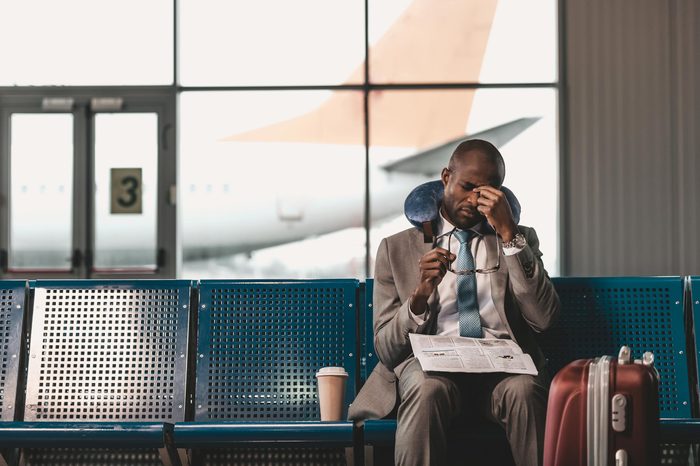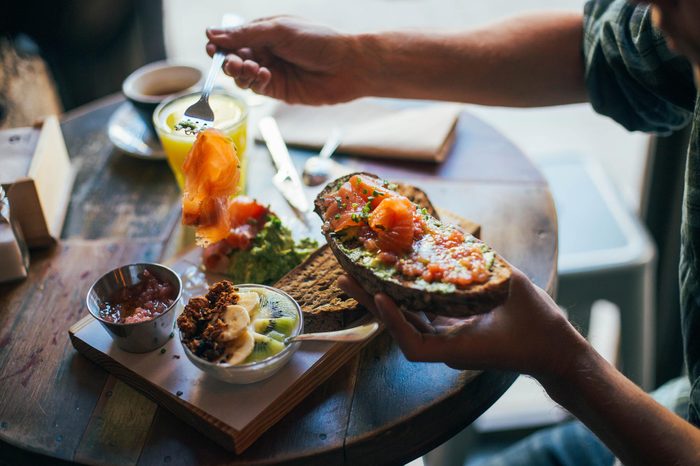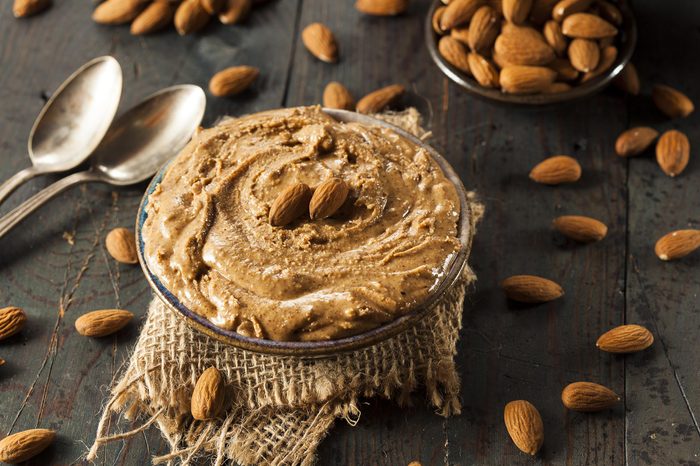
The anti-jet lag diet
Circadian rhythms or your body’s natural internal clock, have been the focus of a great deal of research lately, as science unearths their role in everything from weight gain to depression. But they’re also responsible for a pretty well-known phenomenon: jet lag. By some calculations, 93 percent of travelers will experience this condition, also known as time change syndrome or desynchronosis.
“Jet lag happens when your sleep pattern is disturbed,” explains Bonnie Taub-Dix, RDN, creator of BetterThanDieting.com. “Generally our internal clocks tell us when to go to sleep at night and when to wake up in the morning, but when crossing time zones, our body rhythms get out of sync.” While the effects of this tend not to have a serious or lasting effect on health, they can be disruptive for up to several days.

Why diet matters
Exactly how jet lag takes a toll varies from person to person, but symptoms often include extreme fatigue, insomnia, mood swings, headaches, nausea, and loss of appetite. Why so many diet-related issues? Research shows a close connection between circadian rhythms, daylight, and food—it’s one reason shift workers tend to have weight problems.
So it makes sense that what you eat, as well as when, can make a difference in the kind and severity of symptoms you experience when jumping time zones. Here are some other things that can make a difference.

Adjust meal times
There is actually a diet specifically developed to beat jet lag. It was developed in the 1970s, by a biologist who worked for the Department of Energy’s Argonne National Laboratory in Illinois. A 2002 study published in Military Medicine found that following it made travelers 7 to 16 times less likely to experience jet lag, depending on whether they were traveling west or east, respectively. But while effective, it is an undertaking: You’re supposed to start four days before your trip and alternate feasting and fasting days. Intermittent fasting has other proven benefits, even if you’re not travelling.
The shorthand version, though, is to start adjusting your schedule so you’re eating meals close to the times they occur in wherever your plane is landing. Breakfast tended to be the most important meal to sync up, so aim to eat a hearty one at the local time, even if you’re still on the plane when you eat it.

Balance nutrients
Protein, whole grain carbohydrates, and some healthy fat will keep your blood sugar—and therefore energy—levels steady, says Taub-Dix. You’ll especially want that for the first meal of the day at your new location especially. Almond butter on whole grain crackers or a DIY trail mix made of a medley of unsalted nuts and dried fruit are both good choices, and portable, she says. (These foods actually have more protein than an egg.) Carbs are the building blocks of serotonin, a hormone that relaxes you and helps you sleep. To help your body adjust to a new time zone, you can have carb-heavy meals toward the end of the day.

Pack snacks
Travel is full of surprises, including flight delays, so it pays to bring your own food. That way you’re never at the mercy of airport vendors. “I never leave home without a granola bar,” says Taub-Dix. “It has the perfect combo of protein, carbs, and fat while keeping added sugar content down.” Lack of sleep can fuel your appetite, so having a healthy snack on hand can help prevent you from overeating, too. We love these crunchy snack options.

Don’t forget to hydrate
Dehydration can mimic a lot of the symptoms of jet lag, and planes can be dry places, so to avoid compounding the problem, drink up! “Think of drinking water the way you would washing your hands when you cook,” says Taub-Dix. “You should do it before, during, and after your meal.”
You’ll want to avoid alcohol and caffeine, though. “Caffeine is a stimulant and could keep you from catching up on important sleep time while in flight,” Taub-Dix points out. And although alcohol may make you feel sleepy initially, research shows the sleep quality you get is poor, so you might not feel rested when you land. Here’s what happens to your body when you actually get those 8 full glasses of water.

Eat light
When you do land at your destination, avoid rushing out to have a heavy meal, which could upset your stomach and make you sleepy—or give you indigestion that interferes with sleep. This is especially true if you arrive between standard meal times.
“The best approach is to adapt to the scheduled meals of your new location for breakfast, lunch, and dinner,” says Taub-Dix. “And try to get to bed at a reasonable time so that you can enjoy a full night’s sleep and welcome the new day well-rested. Check out 15 more tips for preventing jet lag.
